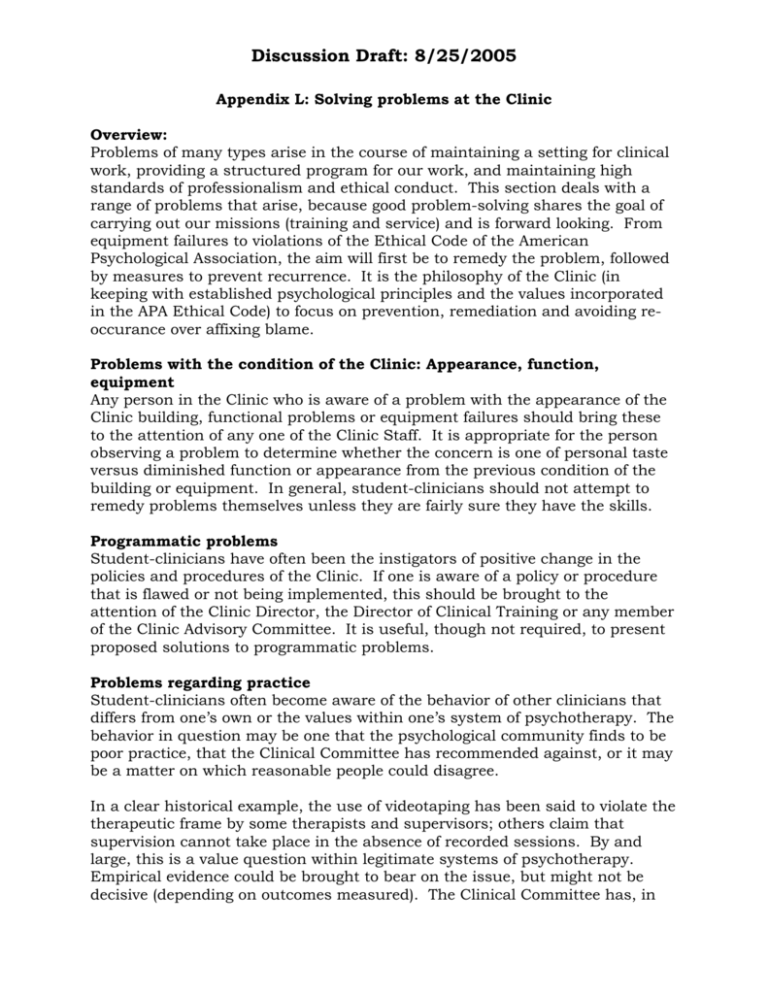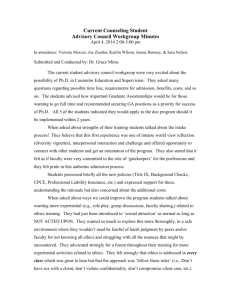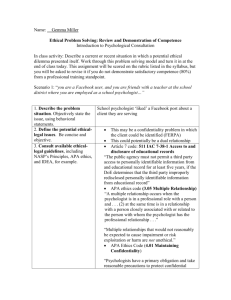Appendix G-Solving problems at the Clinic
advertisement

Discussion Draft: 8/25/2005 Appendix L: Solving problems at the Clinic Overview: Problems of many types arise in the course of maintaining a setting for clinical work, providing a structured program for our work, and maintaining high standards of professionalism and ethical conduct. This section deals with a range of problems that arise, because good problem-solving shares the goal of carrying out our missions (training and service) and is forward looking. From equipment failures to violations of the Ethical Code of the American Psychological Association, the aim will first be to remedy the problem, followed by measures to prevent recurrence. It is the philosophy of the Clinic (in keeping with established psychological principles and the values incorporated in the APA Ethical Code) to focus on prevention, remediation and avoiding reoccurance over affixing blame. Problems with the condition of the Clinic: Appearance, function, equipment Any person in the Clinic who is aware of a problem with the appearance of the Clinic building, functional problems or equipment failures should bring these to the attention of any one of the Clinic Staff. It is appropriate for the person observing a problem to determine whether the concern is one of personal taste versus diminished function or appearance from the previous condition of the building or equipment. In general, student-clinicians should not attempt to remedy problems themselves unless they are fairly sure they have the skills. Programmatic problems Student-clinicians have often been the instigators of positive change in the policies and procedures of the Clinic. If one is aware of a policy or procedure that is flawed or not being implemented, this should be brought to the attention of the Clinic Director, the Director of Clinical Training or any member of the Clinic Advisory Committee. It is useful, though not required, to present proposed solutions to programmatic problems. Problems regarding practice Student-clinicians often become aware of the behavior of other clinicians that differs from one’s own or the values within one’s system of psychotherapy. The behavior in question may be one that the psychological community finds to be poor practice, that the Clinical Committee has recommended against, or it may be a matter on which reasonable people could disagree. In a clear historical example, the use of videotaping has been said to violate the therapeutic frame by some therapists and supervisors; others claim that supervision cannot take place in the absence of recorded sessions. By and large, this is a value question within legitimate systems of psychotherapy. Empirical evidence could be brought to bear on the issue, but might not be decisive (depending on outcomes measured). The Clinical Committee has, in Discussion Draft: 8/25/2005 recent years, reached consensus that video recording is not poor practice; they have not agreed that it is always good practice. Student-clinicians should discuss with their supervisors (all of them), or other experienced clinicians, matters which they question. If the behavior is a poor practice, a plan for approaching the other clinician can be developed that is likely to address the situation (e.g. turning the matter over to the other student’s supervisor or other member of the Clinical Committee). It will be valuable to get multiple opinions for the learning of the student. (also see Pope, Tabachnick, & Spiegel, 1987; 1988 for what experienced clinicians find to be poor practice and what is not). Unethical Behavior Student-clinicians also become aware of behavior on the part of other clinicians that is possibly or certainly unethical. Here, we are talking about behavior that violates or may violate the APA’s “Ethical principles of psychologists and code of conduct” (APA, 2002, hereafter, “Ethics Code”). The Ethics Code provides clear directions for what is expected of psychologists if ethical violations are suspected. These apply to student clinicians, with allowances for consultation required by their supervised status. The relevant excerpt from the Ethics Code follows: ETHICAL STANDARDS 1. Resolving Ethical Issues 1.04 Informal Resolution of Ethical Violations When psychologists believe that there may have been an ethical violation by another psychologist, they attempt to resolve the issue by bringing it to the attention of that individual, if an informal resolution appears appropriate and the intervention does not violate any confidentiality rights that may be involved. (See also Standards 1.02, Conflicts Between Ethics and Law, Regulations, or Other Governing Legal Authority, and 1.03, Conflicts Between Ethics and Organizational Demands.) 1.05 Reporting Ethical Violations If an apparent ethical violation has substantially harmed or is likely to substantially harm a person or organization and is not appropriate for informal resolution under Standard 1.04, Informal Resolution of Ethical Violations, or is not resolved properly in that fashion, psychologists take further action appropriate to the situation. Such action might include referral to state or national committees on professional ethics, to state licensing boards, or to the appropriate institutional authorities. This standard does not apply when an intervention would violate confidentiality rights or when psychologists have been retained to review the work of another psychologist whose professional conduct is in question. Discussion Draft: 8/25/2005 (See also Standard 1.02, Conflicts Between Ethics and Law, Regulations, or Other Governing Legal Authority.) 1.06 Cooperating With Ethics Committees Text omitted 1.07 Improper Complaints Psychologists do not file or encourage the filing of ethics complaints that are made with reckless disregard for or willful ignorance of facts that would disprove the allegation. 1.08 Unfair Discrimination Against Complainants and Respondents Text omitted Key to this section of the APA Code of Ethics are the notions that: dealing with ethical violations is serious business; the word “unethical” should not be used lightly given its implication “behavior in violation of the APA code of ethics” as opposed to a more common language sense, each psychologist is responsible for maintaining the ethical standards of psychology, the emphasis is on corrective action over blame, the first line of remedy is an informal approach, psychologist to psychologist, notification and action by others (e.g. Board of Psychologist Examiners) is appropriate and expected under some circumstances, and complaints and concerns should be carefully thought through and not entered into lightly. Certainly for student-clinicians, but also throughout one’s professional life, consultation with other psychologists (supervisors, faculty) is warranted and expected in sorting through problems and possible solutions. Students will almost always want advice of a supervisor or other licensed psychologist when an question of ethical violations arises. References American Psychological Association (2002). Ethical principles of psychologists and code of conduct. American Psychologist, 57, 1060-1073 (available at www.apa.org/ethics). Pope, K. S., Tabachnick, B. G., & Keith-Spiegel, P. (1987) The beliefs and behaviors of psychologists as therapists. American Psychologist, 42, 9931006. Pope, K. S., Tabachnick, B. G., & Keith-Spiegel, P. (1988) Good and poor practices in psychotherapy: National survey of beliefs of psychologists. Professional Psychology: Research and Practice, 19, 547-552.








